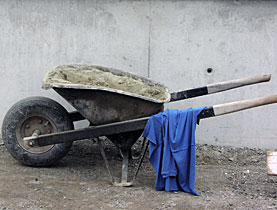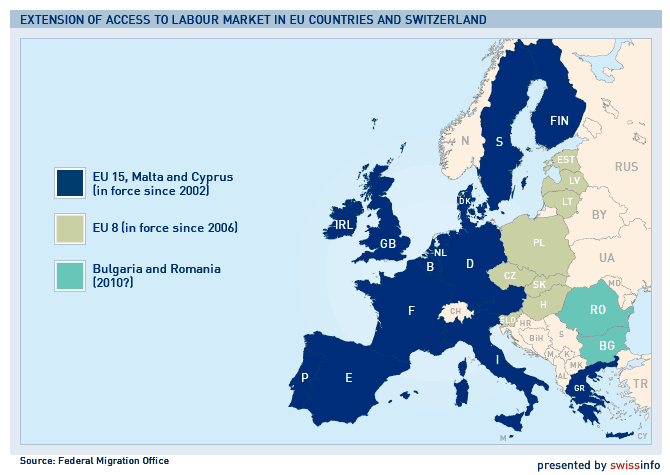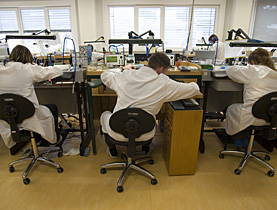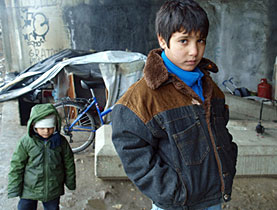Ticino wary despite boon of EU labour deal

Opening up the labour market to the European Union has not adversely affected the southern Swiss Ticino region, according to a recent study.
But voters remain wary of closer ties with the EU as Ticino’s economy is exposed to strong competition from neighbouring northern Italy. A majority of the electorate in southern Switzerland is likely to reject the continuation and extension of a labour accord with the EU in a nationwide vote on February 8.
Pressure on salaries has been limited over the past few years following the gradual opening of the labour market in 2002, said the authors of the report, published in December.
The data dismisses persistent concerns about a wave of foreigners, who continue to make up about 25 per cent of the resident population.
The report, entitled Transformations of the Ticino Labour Market, also says there are no signs of salary dumping as even wage levels of low-skilled workers have increased over the past six years.
The 8.5 per cent increase in the number of cross-border workers to 40,202 by 2007 is the result of the economic upswing and not linked to the open labour market, the report found.
A committee made up of representatives of the canton, employers and employees agrees that the measures introduced to prevent salaries being undercut have helped to bring to light cases of exploitation and allowed the authorities to intervene.
Both trade unions and employers’ organisations also point out a strong boost in the number of personnel agencies offering low paid jobs to cross-border workers, in particular women, and also an increase in on call and temporary employment.
“The accompanying measures have allowed to us correct market distortions that existed before the bilateral accords were introduced,” says Saverio Lurati of the Unia trade union.
“It is clear that we have to remain vigilant and that controls have to be stepped up,” he added.
Boom years
Siegfried Alberton of the Centre for Economic Research and co-author of the report acknowledges that the so-called free movement accord was launched in a period of economic boom.
“We have to see how the market will react in economically more difficult times. Obviously fears are spreading now there is a recession looming,” says Alberton.
Ticino saw economic growth similar to the rest of Switzerland and in line with the northern Italian Lombardy region between 1990 and 2006.
It was marked by periods of growth and stagnation. Experts point out that Gross Domestic Product rose two per cent as a result of the higher volume of work and better productivity in the years 1997-2006.
The structure of the Ticino economy did not experience major changes. All sectors, including banking, industry and trade, benefited from economic growth, according to experts.
The report also highlights an increase in part-time work, particularly for women, and a more flexible labour market. Two out of five new permits for cross-border workers went to women with nearly one in two women not working full time.
The study concludes that the influx of labour from neighbouring Italy is linked to long-term economic growth and not directly attributed to the Swiss-EU accord granting mutual access to the labour markets.
Short-term permits
One of the most noticeable impacts of the open job markets has been an increase in the number of people who obtained permits for fewer than 90 days a year for well-paid activities. That figure more than doubled between 2004 and 2007.
The liberalisation of the labour market has helped to counter the impact of an ageing population and opened up new options for the recruitment of young workers in the employment market, according to the report.
The authors of the study recommend increased market surveillance “particularly in sectors, including trade where the Swiss workforce is under pressure”.
Experts point out that the Ticino labour market is one of the Swiss regions most exposed to international competition and pressure on salaries.
The southern canton is on the fringes of the Lombardy region with its business hub, Milan, in northern Italy.
Nearly 45 per cent of the workforce in Ticino are foreigners – including 20 per cent who live in the southern Swiss region and 16 per cent who commute across the Italian border.
swissinfo, based on an article in Italian by Françoise Gehring

More
Free movement of people
Switzerland is not a member of the EU but it has concluded 20 major bilateral agreements with the 27-nation bloc.
The labour accord, brought into force in 2002 for an initial seven-year period, was extended to eight mostly eastern European countries in 2005 and is set for another extension after the vote in February 2009.
Under the agreement Switzerland and the EU grant each other access to their labour markets.
Parliament approved the continuation of the labour accord and its extension to Bulgaria and Romania last year, but rightwing groups challenged the decision to a referendum.
The Ticino region in southern Switzerland borders northern Italy with its business hub Milan and is part of the Lombardy economic area.
Ticino has a resident population of about 323,000, including 25% foreigners, according to official statistics.
More than 83% of the population speak Italian, while German is the main language for about 8%.
The service sector, including financial companies and tourism employs about 113,000 people, while 46,000 work in industry and 4,700 in agriculture (Federal Statistics Office, figures from 2000/2001).
Nearly 45% of the workforce in Ticino are foreigners, including 20% who live in the southern Swiss region and 16% from across the Italian border.
Ticino voters are notorious for their scepticism towards closer relations with the EU.
In the past they have overwhelmingly rejected European issues, including the Economic Area Treaty with the EU in 1992.
Opinion polls say at least 56% of voters in Ticino will reject the labour deal on February 8. The French-speaking region is largely in favour, while the main German-speaking region appears to be split down the middle.


In compliance with the JTI standards
More: SWI swissinfo.ch certified by the Journalism Trust Initiative



You can find an overview of ongoing debates with our journalists here . Please join us!
If you want to start a conversation about a topic raised in this article or want to report factual errors, email us at english@swissinfo.ch.